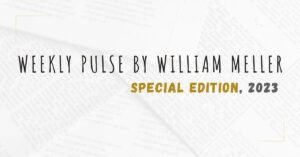The Weekly Pulse is my content curation and my highlights from readings, books, podcasts, insights, and everything I discovered during the week.
So, let’s go with some discoveries from the week!
#1 – Innovation Killers: How Financial Tools Destroy Your Capacity
#2 – Meta Rediscovers the Cubicle
#3 – A Leader’s Framework for Decision-Making
Innovation Killers: How Financial Tools Destroy Your Capacity to Do New Things
Source: Harvard Business Review
Author: Clayton M. Christensen, Stephen P. Kaufman, and Willy C. Shih
Summary: The authors of the document argue that the use of discounted cash flow (DCF) and net present value (NPV) to evaluate investment opportunities causes managers to underestimate the real returns and benefits of proceeding with investments in innovation. Furthermore, they suggest that the focus on short-term earnings per share as the primary driver of share price and shareholder value creation acts to restrict investments in innovative long-term growth opportunities. They suggest alternative methods that can help managers innovate with more astute foresight, and highlight the need for better tools to understand markets, build brands, find customers, select employees, organize teams, and develop a strategy.
Highlights:
“… Discounted cash flow and net present value, as commonly used, underestimate the real returns and benefits of proceeding with an investment. Most executives compare the cash flows from innovation against the default scenario of doing nothing, assuming—incorrectly—that the present health of the company will persist indefinitely if the investment is not made….“
“… The emphasis on short-term earnings per share as the primary driver of share price, and hence shareholder value creation, acts to restrict investments in innovative long-term growth opportunities. These are not bad tools and concepts in and of themselves, but the way they are used to evaluate investments creates a systematic bias against successful innovation.…“
Access full Weekly Pulse reading here >>
Meta Rediscovers the Cubicle
Source: Cal Newport Website
Author: Cal Newport
Summary: Meta is abandoning its open office plan due to employee dissatisfaction and noise-related distractions. They are replacing it with a sound-absorbing, curved cubicle design. This shift may indicate a move away from early 21st-century distraction culture and toward a more productive future (as in the past?).
3 Highlights:
“… Developers need to concentrate,” explained an amused Joel Spolsky at a conference that year, before going on to add that Facebook was paying a 40 – 50% premium for talent because people didn’t want to work under those conditions….“
“… Apparently, the majority of people that work there make sure that they are away from their desk when they need to get work done…“
“… The open office boom is right up there with the spread of Slack as representing the peak of early 21st-century distraction culture — a period in which the knowledge sector completely disregarded any realities about how human brains actually go about the difficult task of creating value through cogitation....”
Access full Weekly Pulse reading here >>
A Leader’s Framework for Decision-Making
Source: Harvard Business Review
Author: David J. Snowden and Mary E. Boone
Summary: Using the Cynefin framework can help executives sense which context they are in so that they can not only make better decisions but also avoid the problems that arise when their preferred management style causes them to make mistakes.
3 Highlights:
“… Simple and complicated contexts assume an ordered universe, where cause-and-effect relationships are perceptible, and right answers can be determined based on the facts…“
“… Complex and chaotic contexts are unordered—there is no immediately apparent relationship between cause and effect, and the way forward is determined based on emerging patterns…“
“… The very nature of the fifth context—disorder—makes it particularly difficult to recognize when one is in it. Here, multiple perspectives jostle for prominence, factional leaders argue with one another, and cacophony rules. The way out of this realm is to break down the situation into constituent parts and assign each to one of the other four realms...”
Access full Weekly Pulse reading here >>
Do you want to get new content in your Email?
I am incredibly grateful that you have taken the time to read this Weekly Pulse.
The Weekly Pulse is an important section of this website, aiming to share good stuff with you every week!
Do you want to explore more? Check more Weekly Pulse content here.
Check my main categories of content below:
- Agile
- Blog
- Book Notes
- Career
- Leadership
- Management
- Managing Yourself
- Productivity
- Project Management
- Technology
- Weekly Pulse
Navigate between the many topics covered in this website:
Agile Art Artificial Intelligence Blockchain Books Business Business Tales Career Coaching Communication Creativity Culture Cybersecurity Design DevOps Economy Emotional Intelligence Feedback Flow Focus Gaming Goals GPT Habits Health History Innovation Kanban Leadership Lean Life Managament Management Mentorship Metaverse Metrics Mindset Minimalism Motivation Negotiation Networking Neuroscience NFT Ownership Parenting Planning PMBOK PMI Politics Productivity Products Project Management Projects Pulse Readings Routines Scrum Self-Improvement Self-Management Sleep Startups Strategy Team Building Technology Time Management Volunteering Work
Do you want to check previous Weekly Pulse posts? Check the last couple of weeks:
- Weekly Pulse by William Meller | Special Edition, 2023
- Weekly Pulse by William Meller | Week 51, 2023
- Weekly Pulse by William Meller | Week 50, 2023
- Weekly Pulse by William Meller | Week 49, 2023
- Weekly Pulse by William Meller | Week 48, 2023
Support my work by sharing my content with your network using the sharing buttons below.
Want to show your support tangibly? A virtual coffee is a small but nice way to show your appreciation and give me the extra energy to keep crafting valuable content! Pay me a coffee:





